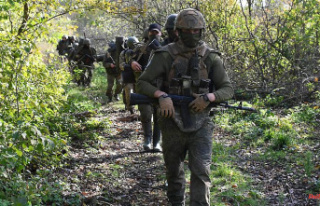After six ministries objected to Chinese involvement in the port of Hamburg, a compromise was on the table: Cosco should only get a minority stake. The chancellor's office determines the agenda and can force the critics to agree to this "emergency solution".
The planned entry of the Chinese state-owned company Cosco at a container terminal in the port of Hamburg continues to cause disputes within the federal government. According to information from government circles, the six ministries involved in examining the deal see a compromise on a reduced participation of 24.9 percent only as an "emergency solution". A "complete ban" is still considered the right way.
However, against the will of the Federal Chancellery, the ministries cannot achieve a cabinet decision for a complete ban. According to reports, the Chancellery is refusing to put this on the agenda and has instead only put the "partial ban" on the agenda.
Meanwhile, time is of the essence: the government would have to object to the deal by next Monday, after which the review period expires. If she doesn't, it is considered approved in its original form - Cosco would then take over 35 percent. Against this background, it is becoming apparent that the line ministries will be forced to agree to the compromise. By limiting a Cosco stake to 24.9 percent, at least a strategic stake is prevented and reduced to a purely financial stake, it said.
The planned deal between the Hamburg port logistics company HHLA and the Chinese state shipping company Cosco has been causing a stir for days. Chancellor Olaf Scholz rejected criticism of it at the EU summit on Friday. Cosco would like to acquire 35 percent of the shares in the container terminal in Tollerort, which is operated by an HHLA subsidiary. The government is investigating whether the deal poses potential security risks as part of an investment review process.
There are four container terminals in the Port of Hamburg, three of which are operated by HHLA. The Tollerort terminal is the smallest in terms of area, but is considered to be efficient and is designed to handle the latest generation of large container ships. It also has its own rail connection. According to HHLA, the terminal has long been used by Cosco ships and is one of the most important hubs for maritime trade between Asia and Europe. China is by far the most important trading partner of the Port of Hamburg. Almost a third of container throughput was accounted for by China trade in 2021.
Against the background of the Ukraine war, the Cosco entry is viewed critically. Many warn of new strategic dependencies on authoritarian states. The opposition parties CDU, CSU and Die Linke, but also politicians from the traffic light coalition parties Greens and FDP, are therefore skeptical of any Cosco participation. "The announced compromise is a political emergency solution. Even a smaller participation deepens the one-sided dependence on China," Jens Spahn, Vice President of the Union Bundestag faction, told the "Rheinische Post".
"Doing something less wrong doesn't mean doing the right thing," said the Greens member of the Bundestag, Anton Hofreiter, of the Funke media group. "The sale of 24.9 percent is better than 35 percent, but the fundamental problems remain." The parliamentary director of the FDP parliamentary group in the Bundestag, Stephan Thomae, told the t-online portal that the port of Hamburg is part of the critical infrastructure. "Giving influence to an authoritarian regime like China here is a mistake."
The SPD parliamentary group, on the other hand, agreed to the compromise. A minority holding by Cosco excludes "special contractual rights," explained Vice-Chairwoman Verena Hubertz in Berlin. This ensures that the company does not exercise any strategic influence. HHLA itself emphasized that the planned deal only relates to the subsidiary that operates the terminal. "Access" to HHLA, the port and its infrastructure or strategic know-how is not associated with this.












